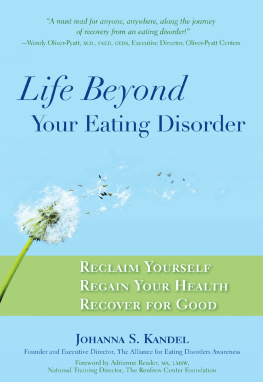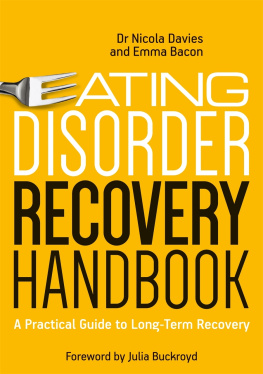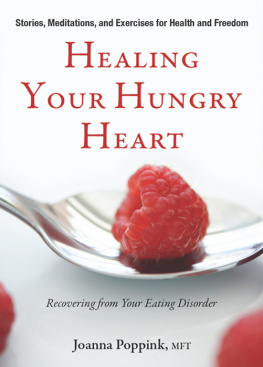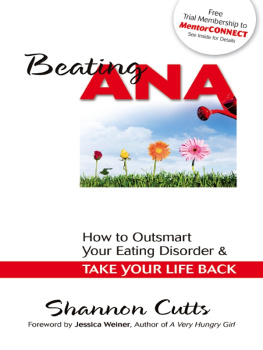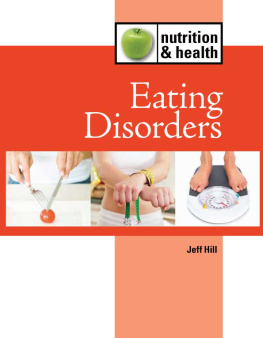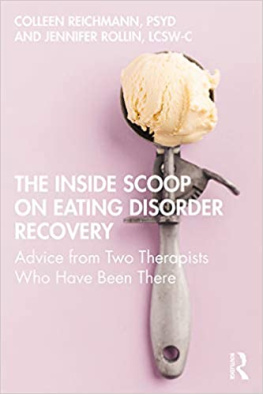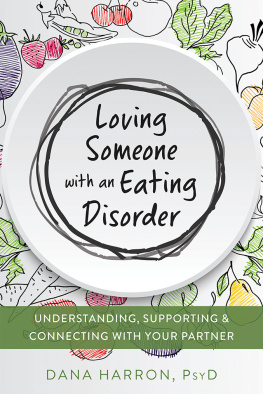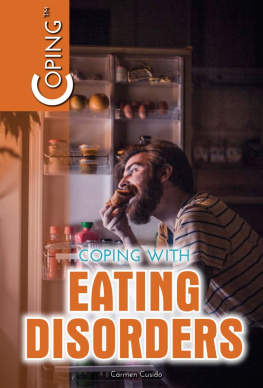PRAISE FOR LIFE BEYOND YOUR EATING DISORDER
A truly inspirational read. Johannas book is packed with sophisticated but practical advice on how to recover from an eating disorder. Most important, she offers hope to those who are struggling with these lethal illnesses.
Craig Johnson, PhD
Director, Laureate Eating Disorders Program, Laureate Psychiatric Hospital Past President, National Eating Disorders Association
Johanna brings us an inspiring personal account of how her struggles with eating disorders impacted her life. In detailing the trials and tribulations she faced during her journey from illness to health, she forges an alliance with readers who suffer from eating disorders, offering them hope and helping them to become more amenable to seeking treatment.
David B. Herzog, MD
Endowed Professor of Psychiatry in the Field of Eating Disorders, Harvard Medical School
Director, Harris Center for Education and Advocacy in Eating Disorders, Massachusetts General Hospital
Johannas warm, conversational tone invites the reader to join her as she openly shares her inner world, and the struggle and triumph of her recovery process. Compassionate, humane and wise, her inspirational story should not be missed. Life Beyond is a must-read for anyone, anywhere, along the journey of recovery from an eating disorder!
Wendy Oliver-Pyatt, MD, FAED, CEDS
Executive Director, Oliver-Pyatt Centers
Finally a refreshing new voice speaks out about full recovery from eating disorders! I am proud to be on the same team as Johanna Kandel. If your life has been touched by an eating disorder in any way, you must read Life Beyond Your Eating Disorder.
Jenni Schaefer
Author, Life Without Ed and Goodbye Ed, Hello Me
Johanna Kandel provides eating disorder sufferers the inspiration to believe in a future beyond recovery. Her exquisite use of metaphors, such as learning to use all the crayons, opening the middle drawer and the importance of floaties, are so vivid that readers instantly understand what actions to take to move them into new spaces. She has indeed choreographed a dance of hope for all who read her book.
Susan Kleinman, MA, BC-DMT, NCC
Dance/Movement Therapist, The Renfrew Center of Florida
Past President, American Dance Therapy Association
Whether you are struggling, in recovery, recovered or helping a family member or friend through this difficult time, this is an amazing resource for you. Johannas story gives each of us hope that not only can we recover from these illnesses, but each of us can help someone who may be struggling to find their way back to health and happiness.
Allison Kreiger Walsh
President and Founder, Helping Other People Eat (HOPE Inc.)
Johanna has taken a brave step forward to reveal her journey through an eating disorder and recovery. Not only will her story shed light on this devastating disease, but her tireless work to make sure all people are aware of the effects of disordered eating is truly commendable. Being a recovered bulimic I know there is a light at the end of the tunnel and I salute Johanna for her tenacity to keep the switch on.
Kathy Kaehler
Trainer
Author,
Teenage Fitness
Ambassador, the Alliance for Eating Disorders Awareness
This book is an excellent navigational tool for the journey toward recovery from eating disorders. With fierce enthusiasm, numerous insights and boundless encouragement, Johanna carries the recovery torch high, illuminating pathways so others can find a life beyond their eating disorder.
Anita Johnston, PhD
Author, Eating in the Light of the Moon
Life Beyond Your Eating Disorder
R ECLAIM Y OURSELF R EGAIN Y OUR H EALTH R ECOVER FOR G OOD
J OHANNA S. K ANDEL
Founder and Executive Director, The Alliance for Eating Disorders Awareness
Foreword by Adrienne Ressler, MA, LMSW , National Training Director, The Renfrew Center Foundation
For all the amazing women in Monday Night Support Group.
You are my biggest inspirations.
Quand on veut, on peut. (When you want it, you can do it.)
R OSALIE B ELILTY, MY GRANDMOTHER
(MY HEALTHY VOICE)
Contents
Foreword
J OHANNA K ANDEL BEGINS THE PREFACE of this wonderful book with a disclaimer, saying what she is notnot a psychiatrist, therapist, nutritionist or doctor of any kind. She does say that she is a recovered individual who knows the physical and emotional journey of those who struggle with an eating disorder. But, oh, Johanna is so much more than that, as those of you reading this will certainly realize by the last chapter. She is a visionary, an activist, a healer, a teacher, an organizer, a warrior, a negotiator, a mediator, an author and an optimist. She is an inspiration to all whose lives she has touched, but never has she wanted to be a role model to be admired, copied or looked up to. This book provides many tales of recovery to help readers understand that there are many paths to healing, each as unique as the traveler herself. The message reinforced here is that there is no room for competition or perfection in recoveryno glory in being the fastest, the best, the thinnest or the most popular. Recovery is a process and the right process is the one that works best for you.
I have been involved in the field of eating disorders for almost thirty years, specifically in the area of body-image treatment and training. I met Johanna when she was nineteen years old and a volunteer working at the International Association of Eating Disorders Professionals (IAEDP) Conference. Just as Johanna has changed and grown since that time, so has the field of eating disorders itself. We now know more than we ever did before about the complexity of eating disorders: their connection to other psychiatric disorders, the gender-biased risk factors, the role of the brain, genetics and ones temperament as variables, the connection between body shame and the culture, and the importance and effectiveness of complementary treatment modalities such as art therapy, dance/movement therapy, spirituality and yoga. Research has given us more information and more tools. We need to always keep the belief alive that recovery is possible, that no recovery is perfect and no one should ever give up. It may be useful to know that the word recover comes from the Latin and means to bring back to normal position or condition. Therefore, the person we discover during recovery is not someone new, but someone we have once been, a person whole and integrated. Recovery needs to be viewed as a continuous process that allows for the development of a greater sense of oneself, not a definite end of symptoms.
Years ago I came across the following passage in the book On Death and Dying by Elisabeth Kbler-Ross. I share it here because I associate it so closely with the struggle involved in freeing oneself from the grasp of the eating disorder:
It is not the end of the physical body that should worry us. Rather, our concern must be to live while were aliveto release our inner selves from the spiritual death that comes with living behind a faade designed to conform to external definitions of who and what we are.
Like a vampire who takes the very lifeblood from the innocents who fall under his spell, so, too, the eating disorder takes the very life spirit of those who relentlessly pursue the seductive belief that their true selves do not measure up to societal expectations and substitute a perfect self in order to be acceptable. Recovery involves a reclaiming of ones true self, giving up the eating disorder identity, making peace with ones body, shifting away from negative self-talk, relinquishing a victim mentality and staying optimistic despite setbacks and difficult times. As Dan Millman, author of Way of the Peaceful Warrior, said, You dont have to control your thoughts; you just have to stop letting them control you.

